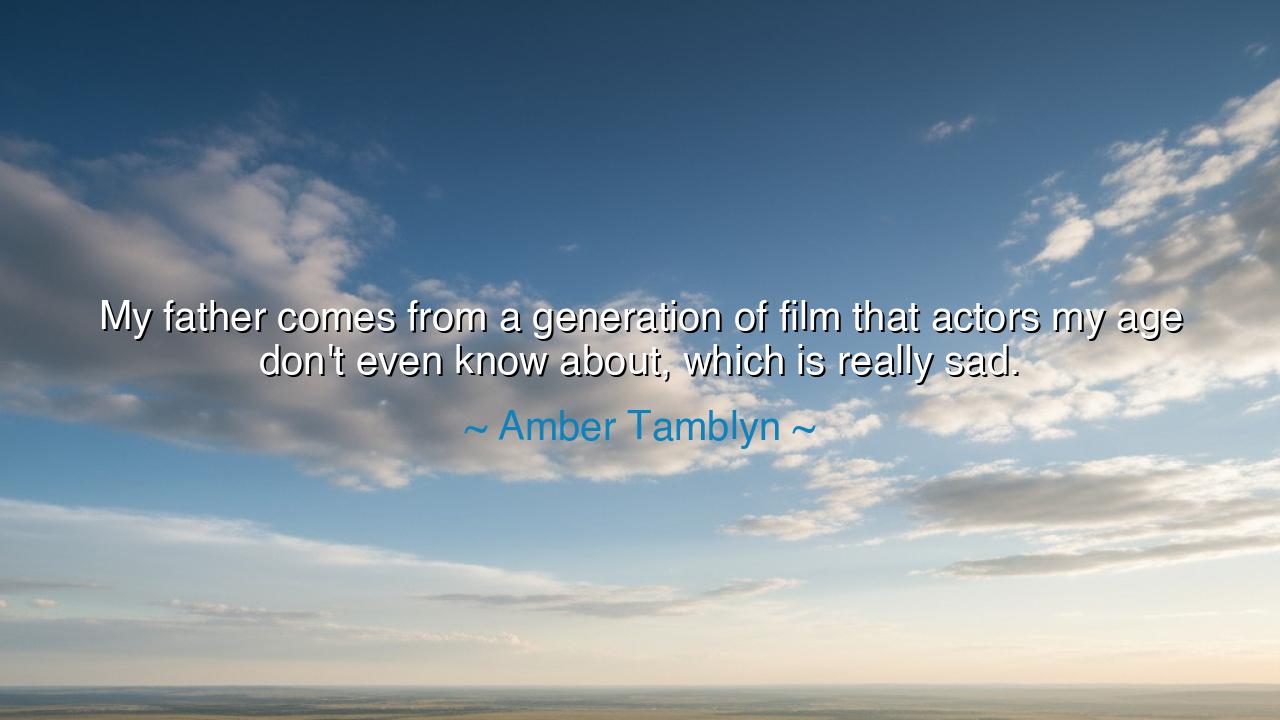
My father comes from a generation of film that actors my age
My father comes from a generation of film that actors my age don't even know about, which is really sad.






Hear the words of Amber Tamblyn, spoken with reverence and lament: “My father comes from a generation of film that actors my age don’t even know about, which is really sad.” In this simple yet profound reflection, she points to the great chasm between the present and the past, the forgetting of traditions, and the fading of wisdom that once shaped the art of storytelling. It is not only a commentary on cinema, but on the eternal human tendency to lose touch with the roots that nourished the tree of culture.
The meaning of her words lies in the recognition that each generation is heir to treasures left by those who came before. In film, as in all arts, the past holds within it lessons of craft, discipline, and vision. Yet in a world rushing forward, many of her peers no longer pause to study those who once lit the path. This forgetting is the sadness she names: that a lineage of artistry, struggle, and achievement lies neglected, unremembered, and thus unable to inspire.
The ancients, too, feared this loss. In Greece, poets like Homer were recited so that each new generation would not forget the deeds of heroes or the voice of the gods. In Rome, elders warned that to neglect the old was to weaken the foundations of the new. What Tamblyn sees in her father’s era of film is the same principle: that the roots of today’s art lie deep in yesterday’s soil, and to ignore them is to risk shallowness, a brilliance without depth.
Consider the story of Akira Kurosawa, the Japanese master whose films influenced directors across the globe. Without his artistry, there would be no Star Wars, no westerns like The Magnificent Seven, no countless echoes that shaped modern cinema. Yet, as Tamblyn laments, many young actors and filmmakers know not his name, nor the names of those like him. This is not only a loss of knowledge—it is a loss of gratitude, a loss of connection with the grand lineage of creators.
Tamblyn’s grief is thus not personal alone but cultural. To forget the artistry of the past is to deny ourselves the fullness of our inheritance. It is to believe, falsely, that art begins with us, when in truth it has always been a river flowing through centuries. When a new generation does not honor the old, they cut themselves off from the very wisdom that could elevate their work beyond the ordinary.
The lesson, O seeker, is this: do not neglect the elders of your craft, your community, your world. Whatever your pursuit—whether art, music, teaching, or labor—seek out the stories of those who came before. Learn their methods, their struggles, their triumphs. For by doing so, you not only honor them, but you also deepen yourself, becoming a vessel not only of the present moment but of the great stream of history.
Practical is this counsel: if you are an actor, watch the films of earlier ages. If you are a writer, read the works of those who laid the path. If you are a builder, study the structures of your ancestors. And in life itself, listen to the voices of your elders before they fade. For one day, you will be the elder, and it will be your wisdom at risk of being forgotten.
Thus Amber Tamblyn’s words stand as both sorrow and summons: “My father comes from a generation of film that actors my age don’t even know about, which is really sad.” Let us not add to this sadness by forgetting our roots. Instead, let us become bridges—linking past to present, and present to future—so that the river of human artistry and wisdom may never run dry.






AAdministratorAdministrator
Welcome, honored guests. Please leave a comment, we will respond soon